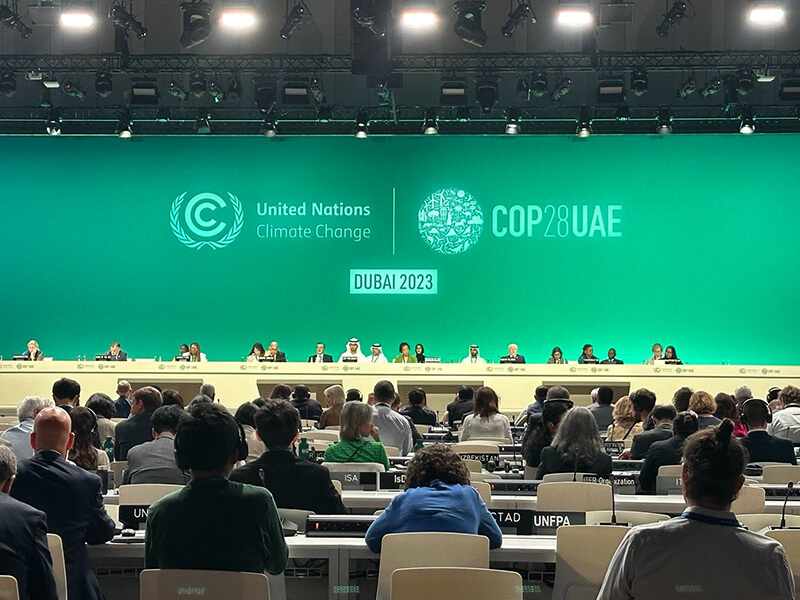
COP28 Negotiations. Photo: Milena Sergeeva
Dubai, December 8, 2023:- As COP28 climate negotiations head into week two, governments are finalising the details of a two year process to agree the direction of adaptation action. These discussions will define how and whether progress on adaptation is framed and measured in future years in order to effectively protect people’s wellbeing in the face of a changing climate. Called the Global Goal on Adaptation (GGA), this aspect of the negotiations to implement the Paris Agreement sets out goals for preventing, anticipating and preparing for the escalating impacts of climate change. At issue is whether the GGA will include actual targets to help track actions and outcomes for human health and well being, targets against which efforts can be measured, judged, and held to account – and whether adequate support will be provided to enable practical implementation.
“Including targets for health actions and outcomes in the Global Goal on Adaptation during COP28 would mean that low- and middle-income countries are best equipped to adapt to a changing climate, and lets us measure whether their health systems are ready to withstand the impacts they are facing”, said Dr Jeni Miller, Executive Director of the Global Climate and Health Alliance. “Omitting these targets would not only have grave implications for the well being of people living in these countries, it would have global implications – infectious disease outbreaks in countries without resilient health systems pose a threat both locally to populations in the affected country, and to global health security, as we have recently seen.”
The US, Europe, Japan and Australia have been opposing inclusion of clear health and other thematic targets in the Global Goal on Adaptation, but negotiations are ongoing. Setting targets for health adaptation would make wealthier countries responsible to help low and middle income countries achieve those targets, and brings costs associated with that.
“Healthy populations are both a pillar of climate resilience, and a mark of effective adaptation – wealthy countries must ensure that the Global Goal on Adaptation includes these health and wellbeing targets”, continued Miller. “Without effective adaptation within and beyond the health sector, we can expect to see many more deaths, disabilities, and other health harms, as well as economic turmoil when extreme storms, drought or other impacts hit.”
Other health relevant targets being considered include those for water, sanitation, and poverty reduction.
“During COP27, countries committed to establishing a ‘loss and damage’ mechanism by which countries more responsible for driving climate change provide funds to help heavily impacted developing countries rebuild and recover from serious climate impacts. Ineffective or inadequate adaptation means low income countries will face far greater losses and damages, putting wealthy countries on the hook for more loss and damage costs”.
Miller stated, “The continued failure of the governments of wealthy countries to cut greenhouse gas emissions has ushered us into an era of repeated, severe climate impacts. If, during COP28, countries now fail to take steps to adapt to these climate impacts, they will put everyone’s health at even greater risk”
“It is in everyone’s interest to ensure that all countries are adapting to climate change in ways that effectively protect people’s health. Without targets, for health action and outcomes, and for financial and other implementation support, there will be no accountability to ensure that happens.”
ENDS
Notes:
UNFCCC Global Goal on Adaptation Submission, 5 September 2022, Rationale for a health metric in monitoring progress towards the GGA – World Health Organization and the Global Climate and Health Alliance.
https://www4.unfccc.int/sites/SubmissionsStaging/Documents/202209161510—WHO.GCHA_GGA_submission2.pdf
Contacts:
Dave Walsh, Communications Advisor, Global Climate and Health Alliance, [email protected], +34 691 826 764
About GCHA
The Global Climate and Health Alliance is a consortium of more than 160 health professional and health civil society organizations and networks from around the world addressing climate change. We are united by a shared vision of an equitable, sustainable future, in which the health impacts of climate change are minimized, and the health co-benefits of climate change mitigation are maximised.
Find out more: https://climateandhealthalliance.org/about/

